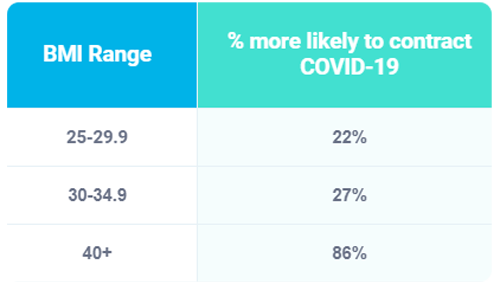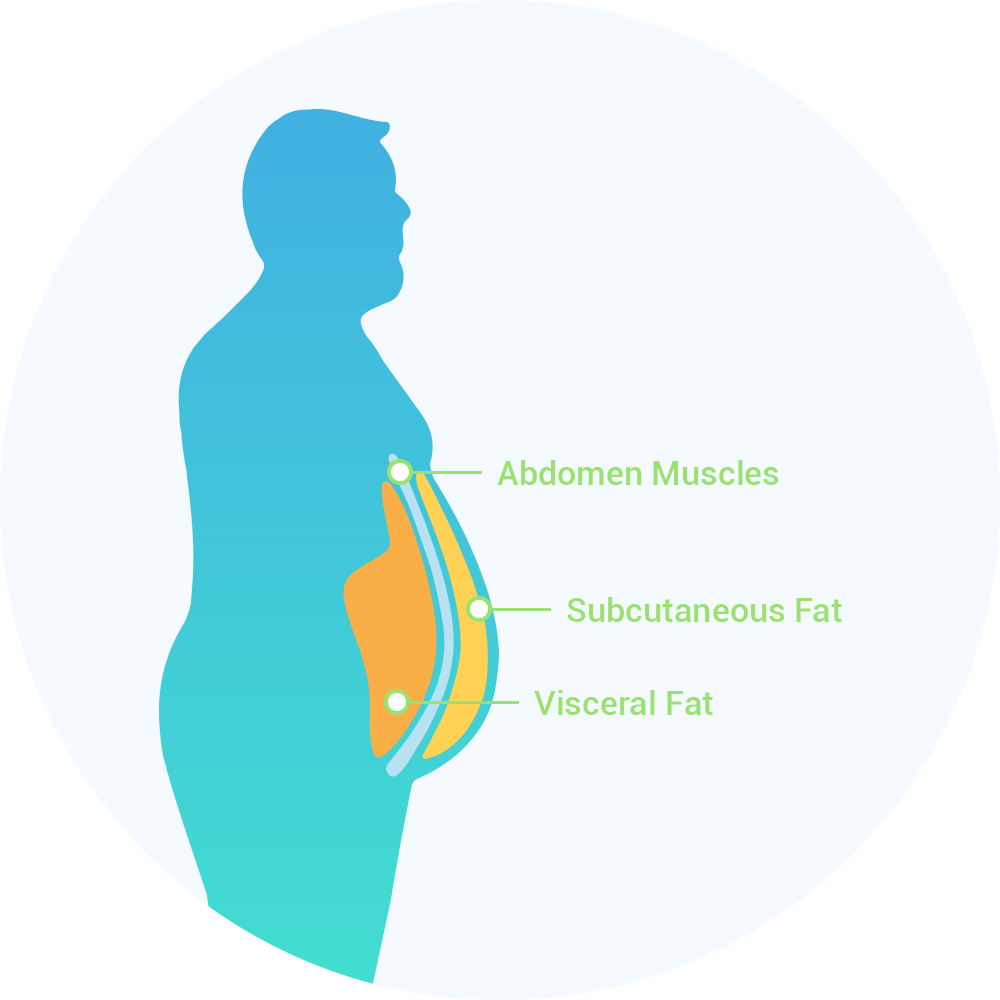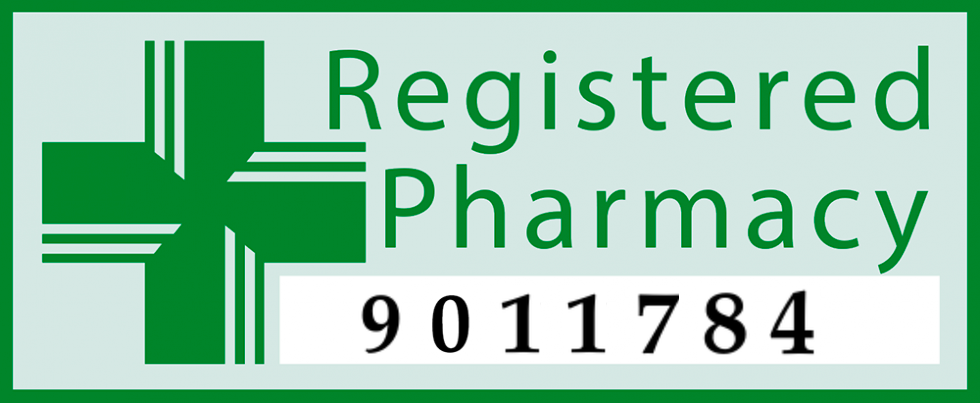Obesity and Covid – the links and the risks
Since early on in the COVID-19 pandemic, obesity has been listed as a risk factor for the virus, with severely obese (BMI of 40 or above) people being included in the list of those who are at high risk of COVID.
However, as the pandemic has progressed, we’ve been able to understand more about it, and how it affects those with a high BMI.
New research has strengthened the link between a high BMI and the risk of COVID, showing that even those who aren’t severely obese are at a higher risk of contracting the virus than people who have a “healthy” BMI (18.5-24.9).
If you aren’t sure what your BMI is, the NHS have a free calculator that you can use – you just need your current weight and height.
A Higher BMI can increase your risk of contracting COVID-19
On the 11th May 2021, new research was announced which discovered a relationship between having a high BMI & testing positive for COVID.
The research comes from the Chaim Sheba Medical Centre in Israel, and is a renewed worry for overweight people, as the findings show that even those with a BMI of 25 are at an increased risk of contracting COVID-19.
Compared to people within a “healthy” BMI range of 18.5-24.9, the study showed that people in the following BMI groups had a higher risk of testing positive for SARS-CoV-2:

In other words, it was found that people with a BMI of between 25-29.9 were 22% more likely to test positive for COVID-19 than someone with a “healthy” BMI.
This risk increased to 27% for those with a BMI of 30-24.9, and for the severely obese, with a BMI of over 40, the risk increased significantly to 86%.
The researchers said:
“As BMI rises above normal, the likelihood of a positive SARS-CoV-2 test result increases, even when adjusted for a number of patient variables.”
The findings from the study support the idea that the risk of contracting COVID-19 increases the higher your BMI is.
In fact, the researchers go on to explain that for every 1kg/m2 rise in BMI, the risk of COVID-19 increases by around 2%.
In addition to this, data from Public Health England (PHE) also supports the fact that a higher BMI can lead to complications of COVID-19.
A report from the Intensive Care National Audit and Research Centre (ICNARC) shows that up until 21 May 2020, 7.7% of patients that were critically ill in an ICU unit with COVID-19 were morbidly obese.
Compare this to just 2.9% of the population being morbidly obese and the numbers speak for themselves.
This data strongly suggests a link between severe obesity and a risk of being critically ill with COVID-19.
The same report also showed a link between high BMI (30+) and an increased risk of death from COVID-19.
Another study carried out in the UK used data from over 400,000 patients linked to COVID-19 test data.
Results showed that positive results were more likely with a higher BMI (over 25) – similar to what the Israel study has found.
Abdominal obesity can mean trouble if you get COVID-19
More research, this time from IRCCS Policlinico San Donato in Italy also supports claims that obesity is linked to increased risks when it comes to the novel coronavirus.
In April 2021, the research from Italy showed that abdominal obesity was linked with higher chest x-ray severity scores in COVID patients compared with tests from people who didn’t have any abdominal obesity.
When it comes to chest x-ray severity (CXR) tests, the lungs are divided, with 3 zones in each lung.
Each zone is then examined to determine the severity of the damage.
A score of 0 means that the lung appears to be functioning normally, whilst a score of 3 indicates severe damage.
The maximum score that anyone can get is 18 – which indicates severe damage in both lungs.
This study from the IRCCS Policlinico San Donato revealed that 9% of patients with abdominal obesity received high CXR severity scores, compared with just 35% of those who didn’t have any abdominal obesity.
Abdominal obesity often indicates a high amount of visceral fat.
Visceral fat is fat that’s stored around the organs in your abdomen, but we can’t usually see it.
Visceral fat is hidden beneath the surface behind a wall of muscles, and can cause many serious health problems – and now it seems as though lung damage from COVID-19 should be added to that list.

Whilst general obesity is also linked with increased risks associated with COVID, the researchers in Italy found that waist circumference and waist-to-height ratio were more closely related to high CXR scores than general obesity (BMI).
Queen’s Speech prioritises tackling obesity
On 11/05/2021, Queen Elizabeth II gave a speech at the state opening of Parliament which outlined the Government’s agenda for the coming year.
Included in the agenda is a focus on healthcare and wellbeing – particularly tackling obesity and improving mental health.
A bill is intended to be passed this year in the UK which will see new restrictions on “junk food” adverts (foods that are high in salt, fat and sugar).
The bill, when passed, would see adverts for these types of foods (chocolate, certain crisps etc) banned on TV until the 9 pm watershed, and they could even be blocked online.
This is in a bid to tackle childhood obesity by limiting the promotion of foods that are high in salt, fat and sugar to times when TV programs are aimed at an adult audience.
It’s not yet clear whether other measures will be brought in to tackle obesity in other ways, such as more funding for bariatric services.
What you can do to stay safe
If you’re concerned that your weight could be putting you at risk of COVID-19, or any other health problems, you should speak to your GP and take steps to change your lifestyle.
This could include modifying your diet, exercising more, or even taking medication that can help you to lose more weight.
If you’re looking for more information on what you can be doing to manage your weight at home, our advice section has loads of great articles that you can take a look at for some inspiration.
Many people with obesity struggle with losing weight naturally, and find that they often need some extra help in order to become healthier.
Often, this can be in the form of medication, like GLP-1 receptor agonists or fat binders.
If this is something you’re considering, please complete an online consultation form at the top of the page.
One of our weight management specialists will review your consultation and make a decision based on your safety and best interests.
For more information and pricing, please take a look at our treatment plans.
In the meantime, to keep yourself safe, you should follow the government guidance, maintain social distancing wherever possible, wash and sanitise your hands regularly, and wear a face-covering when in public.
















